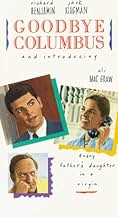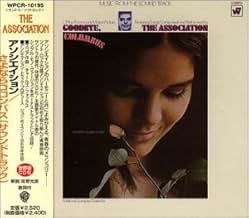IMDb-BEWERTUNG
6,4/10
2455
IHRE BEWERTUNG
Füge eine Handlung in deiner Sprache hinzuAn intelligent graduate and working-class Army veteran has an affair and clashes with a 'nouveau riche' young woman who cares not for birth control or the use of any other precautions to avo... Alles lesenAn intelligent graduate and working-class Army veteran has an affair and clashes with a 'nouveau riche' young woman who cares not for birth control or the use of any other precautions to avoid pregnancy.An intelligent graduate and working-class Army veteran has an affair and clashes with a 'nouveau riche' young woman who cares not for birth control or the use of any other precautions to avoid pregnancy.
- Regie
- Drehbuch
- Hauptbesetzung
- Für 1 Oscar nominiert
- 4 Gewinne & 9 Nominierungen insgesamt
Chris Schenkel
- Voice on Columbus Record
- (Synchronisation)
Jay Jostyn
- Voice on Columbus Record
- (Synchronisation)
Rey Baumel
- Uncle Harry
- (as Ray Baumel)
Empfohlene Bewertungen
Truly a period piece, Goodbye, Columbus is, certainly, an attempt to show the differences between two people of the Jewish religion. While I agree with many of the folks that commented on this film regarding the differences between Brenda's family and Neil's family, I don't see it as a matter of the wealthier character's family having no class and the poorer character having much more. I knew many families that were similar. My upbringing was more similar to Neil's as we were not wealthy. Klugman convey's the typical successful Jewish business man with a good heart. He works hard to provide a very comfortable environment for his wife and children. He is a very loving father and doesn't flaunt his wealth in the film. His family means everything to him. Benjamin's character, while exposed on occasion to the "good life", is content in knowing that he's OK despite his modest position in life. What's important in this film is that he knows there may be something in life that is better than working in a library, but he's not about to sell his soul to get rich just for the sake of being able to live the Potimkin's lifestyle. This film accurately portrays a young man early in his career and life and one of his early attempts at choosing between a safe secure future by marrying a beautiful, intelligent and not-too-spoiled Jewish girl or trying to see if he's really in love with HER and not the family money or trappings. This was a relatively low budget film that made you think. It tried to show how tough it is for a poorer man to deal with his demons in choosing the kind of woman and life he wanted. All in all, this film is an accurate slice of life in the Jewish community and is as relevant today as it was then.
A splendid film for a lot of reasons. The Phillip Roth novel from which the film was adapted supplies unusually good dialogue for the script and an excellent structure on which the director can hang visual and audio elements that meaningfully support the story. Check out how well the musical score shifts to support the mood of each scene. Then there is an excellent cast.
The title is a reference to the brother, a basketball player at Ohio State in Columbus, who frequently listens to an OSU sports commentary that signs off with "Goodbye Columbus". And the song lyrics "Hello life, goodbye Columbus" relate to leaving the protection of home/school to face the world.
Although "Goodbye Columbus" is usually thought of as the "The Graduate" with a different ending, it is much more like "Adam at 6AM". The three films were made at the very end of the 1960's, all had a searching young man as their main character, and all revolved around a new romantic relationship. But in "Goodbye Columbus" and "Adam" the tension is not between different generations but between different backgrounds and values. In both the young man eventually realizes that these differences cannot be overcome and both films go out with shots of him leaving.
At the time of its release "Goodbye Columbus" was more dated than the other two more "with-it" movies, which at least acknowledge the counterculture changes that were taking place at the time. Ironically, 35 years later, its failure to incorporate these references make it the least dated of the three films.
The soundtrack album featuring "The Association" (and incidental music composed by Charles Fox) was probably the kiss of death for that group's credibility whatever their musical merits. While cool to be part of an outside film like "Easy Rider", it was uncool to be associated with a Hollywood product like "Goodbye Columbus". This was the summer of Woodstock and by then "The Association" had pretty much lost their audience. In addition to the title song they contributed "It's Gotta Be Real" and "So Kind To Me."
It's two most famous scenes have held up very well: the montage of Ali MacGraw swimming during the title sequence and the comical wedding guests "pig-out" at the buffet table.
This was the film that really introduced fashion model Ali MacGraw to movie viewers. She was 28 playing a 21 year-old college student. Much more believably than just a year later in the somewhat pathetic "Love Story". Physically MacGraw passes fine for a younger woman and being older probably helped her hold her own in scenes with the more experienced Richard Benjamin, Nan Martin, and Jack Klugman. She is excellent in this role and manages to stay accessible and genuine while also projecting poise, grace and beauty.
Benjamin's character is genuinely attracted to MacGraw but seems to maintain a healthy skepticism about the romance (along with pretty much everything in life). MacGraw's Brenda finds him attractive because of his differences but she is really her Daddy's girl and her rebellion is more playful than serious. The best scene is the father-daughter session at the wedding very late in the film. Jack Klugman character knows just the right buttons to push and it is at this point that you know the romance is truly doomed.
The cinematography is first-rate and while the widescreen DVD showcases this, it has been inexcusably trimmed to qualify it for a "PG" rating. The DVD version is only 101 minutes long. Entire sequences have been deleted including the critical first sex sequence where birth control methods are discussed (foreshadowing) and the sequence with the rationale for his moving in with the family for two weeks. Also missing is all the vaguely graphic elements dealing with her initial refusal to have sex. If you are a first time viewer watching the DVD version and find puzzling narrative gaps in the story or incomplete motivational explanations, the trimming is the reason. The trimmed sequences are on the "R" rated VHS, so to see this as intended (widescreen and uncut) you will need to buy both the DVD and the VHS and reconstruct things.
The title is a reference to the brother, a basketball player at Ohio State in Columbus, who frequently listens to an OSU sports commentary that signs off with "Goodbye Columbus". And the song lyrics "Hello life, goodbye Columbus" relate to leaving the protection of home/school to face the world.
Although "Goodbye Columbus" is usually thought of as the "The Graduate" with a different ending, it is much more like "Adam at 6AM". The three films were made at the very end of the 1960's, all had a searching young man as their main character, and all revolved around a new romantic relationship. But in "Goodbye Columbus" and "Adam" the tension is not between different generations but between different backgrounds and values. In both the young man eventually realizes that these differences cannot be overcome and both films go out with shots of him leaving.
At the time of its release "Goodbye Columbus" was more dated than the other two more "with-it" movies, which at least acknowledge the counterculture changes that were taking place at the time. Ironically, 35 years later, its failure to incorporate these references make it the least dated of the three films.
The soundtrack album featuring "The Association" (and incidental music composed by Charles Fox) was probably the kiss of death for that group's credibility whatever their musical merits. While cool to be part of an outside film like "Easy Rider", it was uncool to be associated with a Hollywood product like "Goodbye Columbus". This was the summer of Woodstock and by then "The Association" had pretty much lost their audience. In addition to the title song they contributed "It's Gotta Be Real" and "So Kind To Me."
It's two most famous scenes have held up very well: the montage of Ali MacGraw swimming during the title sequence and the comical wedding guests "pig-out" at the buffet table.
This was the film that really introduced fashion model Ali MacGraw to movie viewers. She was 28 playing a 21 year-old college student. Much more believably than just a year later in the somewhat pathetic "Love Story". Physically MacGraw passes fine for a younger woman and being older probably helped her hold her own in scenes with the more experienced Richard Benjamin, Nan Martin, and Jack Klugman. She is excellent in this role and manages to stay accessible and genuine while also projecting poise, grace and beauty.
Benjamin's character is genuinely attracted to MacGraw but seems to maintain a healthy skepticism about the romance (along with pretty much everything in life). MacGraw's Brenda finds him attractive because of his differences but she is really her Daddy's girl and her rebellion is more playful than serious. The best scene is the father-daughter session at the wedding very late in the film. Jack Klugman character knows just the right buttons to push and it is at this point that you know the romance is truly doomed.
The cinematography is first-rate and while the widescreen DVD showcases this, it has been inexcusably trimmed to qualify it for a "PG" rating. The DVD version is only 101 minutes long. Entire sequences have been deleted including the critical first sex sequence where birth control methods are discussed (foreshadowing) and the sequence with the rationale for his moving in with the family for two weeks. Also missing is all the vaguely graphic elements dealing with her initial refusal to have sex. If you are a first time viewer watching the DVD version and find puzzling narrative gaps in the story or incomplete motivational explanations, the trimming is the reason. The trimmed sequences are on the "R" rated VHS, so to see this as intended (widescreen and uncut) you will need to buy both the DVD and the VHS and reconstruct things.
This movie was meaninful to me because the characters represent real people. People who the main character, Neil, rejects (or at least cannot relate to) because of what they represent. For example, the hard-charging businessman played by Jack Klugman, who's portrayed in his plumbing-supply office screaming into the phone, making deals. The brother, played by Michael Myers (not the famous Mike Myers) is the ultimate very-dumb jock. And, of course, Ali McGraw, who's is actually torn between being the good Jewish American Princess and her attraction to Neil. Her father (Klugman) is dumbfounded when he learns that Neil doesn't really mind being a librarian. Finally, Richard Benjamin's Neil, is a kind of existential Jewish outsider who can't relate to the affluence displayed by the Patimkins. One of the more memorable scenes in the movie: Neil discovers a second refrigerator in the Patimkin's basement PACKED with food. Are these people real? They are. And even though the movie is 35 years old we can still relate to these characters. Thank you Phiip Roth.
8wbe3
I recently saw this film again after seeing it when I was twelve (progressive Jewish parents).
I didn't remember much about it except that Ali MacGraw took her clothes off, that it reminded me A lot of my family at the time, and that there was a very moving scene in a library with Richard Benjamin and a small African American boy.
I was right on all counts -- Ali looks great (her first film), it STILL reminds me of my family and when I showed it to some friends of mine (also Jewish) they all said the same about their families, and the scene in the library is just as I remembered it. I was as moved today, some 36 years later, as I was back then.
A wonderful comedy.
I didn't remember much about it except that Ali MacGraw took her clothes off, that it reminded me A lot of my family at the time, and that there was a very moving scene in a library with Richard Benjamin and a small African American boy.
I was right on all counts -- Ali looks great (her first film), it STILL reminds me of my family and when I showed it to some friends of mine (also Jewish) they all said the same about their families, and the scene in the library is just as I remembered it. I was as moved today, some 36 years later, as I was back then.
A wonderful comedy.
I saw Goodbye, Columbus when it was released and found it almost as profound and moving as The Graduate. Why has this movie been so neglected and forgotten? Why is it not shown on network or cable? It's terrific and still timely. Anyone have any ideas?
Wusstest du schon
- WissenswertesRichard Benjamin said of Ali MacGraw: "The camera looks into your soul, and it looked into Ali's. Men loved her, women loved her. She was a real movie star."
- PatzerAt the dinner table, Julie is told that it is earlier in Columbus, where Harriet is calling from, than where she lives in New York. In fact both cities are in the same Eastern Standard Time Zone. In the book, Harriet is calling from Milwaukee in the Central Time Zone, which is correct. However, when the screenplay changed her location to Columbus, the writer failed to realize this fact and change the dialogue or the city.
- Zitate
Brenda Patimkin: Are you serious?
Neil Klugman: I'm way the hell past serious: I'm suicidal.
- VerbindungenEdited into The Kid Stays in the Picture (2002)
Top-Auswahl
Melde dich zum Bewerten an und greife auf die Watchlist für personalisierte Empfehlungen zu.
- How long is Goodbye, Columbus?Powered by Alexa
Details
Box Office
- Bruttoertrag in den USA und Kanada
- 22.939.805 $
- Laufzeit1 Stunde 42 Minuten
- Sound-Mix
- Seitenverhältnis
- 1.85 : 1
Zu dieser Seite beitragen
Bearbeitung vorschlagen oder fehlenden Inhalt hinzufügen


























